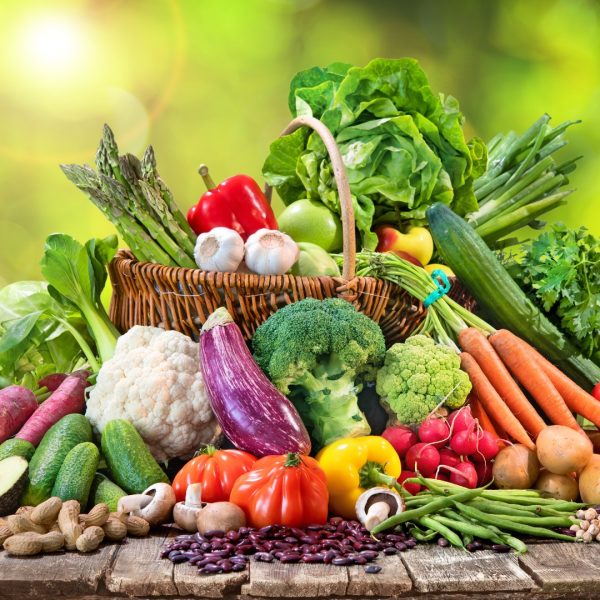In honor of Mother’s Day, I wanted to talk about why womens nutrition is so important.
Women’s health is the lifelong journey from adolescence through menopause, where a woman’s body has shifting needs as the demands of her choices and circumstances change.
A woman’s total nutrition (food, supplements, beverages) need to combine to deliver her body what it needs to run optimally.
Other factors, such as what you’re exposed to, how you manage stress, your eating habits, your community, and time in nature, all combine to impact your healthI
Women have unique needs through various life stages and can thrive with targeted support. In this blog post, you’ll learn how your current nutrition choices may be impacting your health and what you can do to make better choices for better health.

Do You Eat A Rainbow Of Fruits and Veggies?
I ask about a rainbow — which includes white (like cauliflower), brown (mushrooms), spices, and teas—because all of the colors in nature, from plants, help your body run better. They are involved in reducing the risk of disease, detoxification, and many other efforts.
If yes, great job! If not, keep reading for a few tips on why eating a rainbow is so vital for womens health.
Cruciferous vegetables support fertility by providing glucoraphanin – the inactive form of Sulforaphane, a potent activator of the NrF2 pathway at the heart of the body’s antioxidant defense system.
NrF2 controls the production of over 200 proteins that protect your cells from oxidative stress. Sulforaphane also helps support the healthy metabolism of estrogen and contributes to overall hormone balance in a number of ways.
Berries support women’s health by providing antioxidants and anti-inflammatory phytonutrients that help protect reproductive tissue. And may be especially important for preventing the growth of cancer cells.
Common cooking spices like cinnamon and turmeric are also excellent sources of antioxidants and anti-inflammatory phytonutrients. You may be seeing a theme here! For the same reasons as berries, spices are key for women’s health.
Are Fermented Foods Important For Womens Nutrition?
Absolutely! Fermented foods support the female body in a number of ways. One is by providing probiotics and enzymes that support healthy digestion.
Having a healthy microbial balance throughout the body is key as it helps reduce inflammation, keep immune dysfunction at bay, and protect reproductive organs like the uterus from stealth infections that are difficult to detect.
What About Beans And Legumes?
Beans provide protein, fiber, and trace minerals all important for women’s health at every life stage. Fiber is particularly important for hormone balance in a number of ways including helping your body remove excess estrogen that your liver has neatly packaged up for removal via your stool.
Legumes as a whole are good sources of fiber, which supports hormonal balance and digestion. Legumes have also been found to lower the risk of coronary heart disease and stroke in women.
Beans are also a good source of natural folate, which is critical to have adequate supply preconception because, among many other functions, it helps prevent serious neural tube defects.
Outside of pregnancy, women need folate to help the healthy formation and growth of red blood cells, which helps prevent anemia.
Do You Eat Whole Grains?
Whole grains are those that have not been processed so they retain all of their nutrients. They contribute vitamins and minerals, carbohydrates, and some provide amino acids or even complete protein (quinoa).
If you are avoiding gluten, consuming whole grains that are gluten-free can be a great way to get in many key nutrients.
When grains are refined into white flour two things happen that can impact overall health:
- Nutrient losses may make these products less good sources of key nutrients and also affect the body’s glycemic response (affecting your blood sugar levels).
- Often these products include fortifications of some nutrients. The sources may not be the same quality or quantity that you would find in whole grains.
One of the biggest considerations when it comes to food products that contain grain flours is whether or not the food has been fortified with folic acid.
If the product is whole grain, fortification isn’t necessary because it retains the nutrients. Refined flours require fortification, and thus, have added folic acid.
Folic acid is a much less bioavailable form of folate that many people are inefficient at metabolizing. What happens to the folic acid that our body cannot metabolize?
It remains as “Unmetabolized Folic Acid” and has been shown to decrease natural killer cell activity and negatively impact methylation. Methylation is a fundamental and crucial metabolic process for any stage of life.
Are You A Fan Of Nuts And Seeds?
Nuts and seeds pack healthy fats, fiber, minerals, vitamins, and plant nutrients (phytonutrients) and some provide protein to help your body run better.
Walnuts are a plant-based source of omega-3 fatty acids. Plant-based sources of omega-3 fatty acids are less bioavailable than seafood sources however, walnuts are a great way to help boost your essential fatty acid intake.
Omega-3 fatty acids are anti-inflammatory and are especially beneficial to menopausal women for the role they play in preserving heart, breast, and bone health. Bonus, Omega-3 fatty acids help manage mood.
Do You Consume Dairy and Non-Dairy Products?
There is great variety in these products which will determine which nutrients your body gets based on your choices.
In addition to supporting bone health, dairy products contain conjugated linoleic acid (CLA) which provides anti-inflammatory and hormone-balancing properties.
Dairy provides fat-soluble vitamins like A, D, E, and K, so full-fat options optimize nutrient absorption. Dairy is also the primary source of iodine for people who do not consume adequate seafood.
Are You Getting in Your Protein?
Getting sufficient protein is essential to help the body run better. Your body can make protein from the amino acids it gets in plants (and as noted above, some plants – grains, beans, and seeds provide a complete protein source) as well as from animal sources such as fish, meat, and eggs.
Fish can provide essential fats as well as other key nutrients that the body needs regularly. Seafood can also be a key source of nutrients. The quality of your fish and seafood choices matters.
Contrary to popular belief, wild-caught is not always better for you than farmed fish. It depends on the type of fish, where it comes from, the quality of the water, what the fish are fed, and more.
For example, seafood contains the most bioavailable forms of anti-inflammatory omega-3 fatty acids. It also is a great source of iodine, a nutrient that is vital for healthy thyroid function.
Meats provide choline, vitamin B12, and key amino acids like glycine. These are all nutrients that in plants, cannot be found at all, or in adequate amounts to meet health demands. If you do not consume any proteins from animal sources.
Eggs provide key nutrients (like choline and lutein) especially those in their yolks making whole eggs a better choice more often than egg whites. It is much easier to meet your choline requirements if you eat eggs with the yolk daily. Eggs are a women’s health power food and no matter how they are sourced, they are very nutrient-dense.
Eggs from pasture-raised chickens are even more so. Nutrient analysis studies have shown that eggs from pasture-raised hens are significantly higher in vitamin A, vitamin E, and omega-3 fatty acids. They also tend to be lower in cholesterol and saturated fat.
Choline also plays a role in liver function and can prevent liver disease in women. There are also some studies that say choline can help reduce the risk of breast cancer, cognitive decline, and dementia.

Soy And Womens Nutrition
Soy can be a nutritious, phytonutrient-rich food source or it can be something to limit depending on the quality. In the U.S. and some other parts of the world, soy is often genetically modified and/or heavily sprayed with pesticides and herbicides of which residues remain.
Some of these chemicals, including glyphosate, are known hormone disruptors. Soy also tends to be heavily processed into soy-based food products, compromising the quality of the original food source. The best way to consume soy is to look for organic, whole-food forms like edamame and tofu.
This will help you enjoy the benefits of this food without the glyphosate concerns. Soy is a particularly important food to budget more for because the evidence clearly shows the quality can decide if it supports or harms your health.

Are Beverages A Factor In Womens Nutrition?
Beverages can help us stay hydrated, take in nutrients, and escort them into our cells, as well as eliminate waste products— but they can both positively and negatively impact your health goals.
Water Intake Matters!
Water plays essential roles in the body including waste removal, hydration, and nutrient delivery into the cells. Most of us need at least 40 ounces of water, but we may need more. It is important that you absorb water effectively and don’t just pee out what you drink.
Water quality is important to consider. Filtration can help to remove what may not be better for you to take in regularly. It also removes key minerals important for hydration so you will want to ensure your other food and supplement choices deliver those nutrients.
Hydration also helps the body shed the uterine lining fully and efficiently. If your periods start and stop, are scant, and you have spotting, or cramping, focusing on hydration prior to and throughout your period may make a big difference.
Seltzer has increased in popularity and while it does provide hydration, aluminum cans are typically lined with BPA, a potent hormone-disrupting chemical.
Choosing sparkling water in glass bottles, and naturally flavoring with your favorite option is a good way to avoid these issues with cans. Some products labeled as “water” (coconut, watermelon, tonic) may contain added sugar.
Don’t Forget About Caffeine!
Caffeine is a stimulant and as such impacts hormones, digestion, blood pressure, and sleep. It can trigger “energy” highs and lows, which also may affect food choices, mood, motivation, and exercise/athletic performance.
Its effect on our health is multifactorial including the source, quantity, our genetics, and current health. The quality of both caffeinated and decaffeinated sources that you consume regularly affects your overall health.
Unlike coffee and tea, soda provides no nutritional benefits, and regular consumption is not advised.
Is It Ok To Drink Alcohol?
While the food sources for alcohols – grapes, grains, etc. – can have health benefits (antioxidants, etc.), the process of turning them into alcohol changes their health value.
For women at every life stage, alcohol metabolism requires a lot of nutrients and antioxidants and is an overall burden on our detoxification systems.
When it comes to hormone balance, alcohol competes with the metabolism of hormones through the liver and results in a significant increase in estrogen levels.
Excess estrogen can negatively impact fertility and put women at risk for estrogen-dominant cancers. Alcohol intake should be personalized based on health – physical and emotional – goals as well as genetic.
Can Food Additives Affect Womens Health?
What you frequently add to your foods and beverages can so affect your health.
1. Oils/Fats: quality matters, from the source to processing, to how they are used. Saturated fats get mixed reviews (or very strong opinions) related to overall health. Discuss your intake of foods high in saturated fats with your practitioner who can personalize your plan.
Foods that naturally include saturated fats and are stored/prepared properly – especially plants – can be included in your nutrition plan in most instances.
2. Salt: Iodized salt, in addition to dairy products, is the most common source of iodine in the diet unless you regularly consume seafood which remains the best source of this important mineral.
Iodine is vital to thyroid function and underactive thyroid function is one of the most common reasons for issues with metabolism, weight gain, mood changes, irregular menstrual cycle, dry skin, hair loss, and cardiovascular disease.
If you do not use iodized salt and instead use sea salt, it is important to be more mindful of getting enough iodine from other dietary and supplement sources.
3 Sweeteners: Non-caloric sweeteners can add sweetness – actually, a lot of it (they are often hundreds to thousands of times sweeter than sugar!) – but do not provide any beneficial nutrients.
As mentioned earlier, they can create or worsen a sweet tooth as they are hundreds to thousands of times sweeter than sugar. Excess added sugar as well as processed sweeteners do not help your body run better.
Some sources may be more irritating to your digestive system or raise other health concerns, especially with frequent use or high quantities.
4. Sauces & pre-made dressings vary in their ingredient profile which greatly affects how they help or detract from your health goals.
5. Lemons and limes add flavor and also provide vitamin C and bioflavonoids which support fertility through their antioxidant actions. Pro tip: make sure to save the peel! It has an even higher concentration of bioflavonoids than flesh or juice.
Citrus zest can brighten up the flavor of any dressing or dish and a strip of the peel brewed with your tea, or added to water will act as digestive bitter.
6. Flavor drops do not give your body what it can use to run better. While research may not be clear on how much or which ones cause harm, the main point is that plant colors and flavors provide nutrients our bodies need to promote optimal health.
Upgrade your choices to ones that include real, minimally processed foods for color and flavor,
Conclusion
In conclusion, if you’re a woman prioritizing nutrition is imperative for your overall health and well-being. By incorporating a variety of colorful fruits and vegetables, whole grains, dairy or nondairy products, nuts and seeds, adequate protein, and good hydration, women can unlock the benefits of a well-rounded diet.
Additionally, it’s important to pay attention to the quality of the foods you eat and to focus on nutrient-dense options that will fuel your body. Making small changes to your diet can lead to big improvements in your health and energy levels. So, go ahead and enjoy that rainbow of foods – your body will thank you for it!
If you need more personalized help in devising your very own nutrition plan, check out my offerings. I’d be honored to work with you to help guide you on your journey to better health.
***Disclaimer: This post is for informational purposes only and should not be construed as medical advice***


